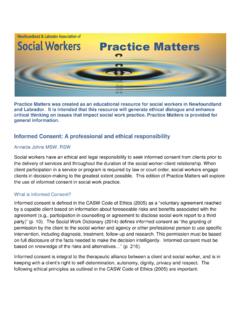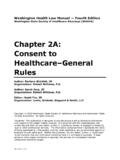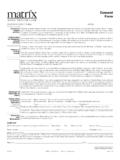Transcription of ACAP School of Counselling Guidelines Record …
1 ACAP School of Counselling Guidelines Record keeping and informed consent of Counselling clients These Guidelines provide ACAP School of Counselling teaching staff and students with guidance on legal and ethical requirements for Record keeping by counsellors, and an outline of the content of Counselling records. The NSW government has enacted legislation to cover the services provided by unregistered health professionals. Counsellors are covered by the legislation and must comply with the Code of Conduct for Unregistered Health Practitioners. Government, professional associations, employers and funding bodies require accurate and appropriate Record keeping of the contacts that counsellors have with their clients.
2 Accurate Record keeping is an important aspect of being professional and accountable for the services counsellors provide to clients. Accurate records assist in making referrals to other services and reporting risk to the client or other parties. Up to date records also ensure that clients receive continuity of care within a team or service when counsellors are on leave. Counselling services can only use client information for the purpose for which it was recorded. Client records cannot be accessed at a later date for research purposes without client consent . Confidentiality Client records in paper and electronic forms should be stored securely at all times.
3 The confidentiality of client records continues on after a client's death unless legal or ethical considerations demand otherwise. Counselling records can be legally accessed by other parties in some circumstances. Therefore, it is important to explain to clients that confidentiality is limited. When counsellors write records of Counselling sessions, they need to keep in mind that other parties (including the client) may read these notes in the future. Clients, ethics committees, courts, lawyers, offenders who are involved in legal processes and coroners may legally have access to Counselling records. It is very important to follow these Guidelines and maintain best practice in Record keeping .
4 Complete records should be kept for a minimum of three years after the last contact with the client. Records, or a summary, are then maintained for an additional twelve years before disposal. If the client is a child, the Record period is extended until three years after the child reaches eighteen years of age. Client records should be disposed of in a manner that maintains confidentiality. Content of Counselling records Counselling records include: Intake information, including at a minimum who has referred the client to the service, contact details, date of birth and the nature of the presenting problem. 1. Assessment conducted in the first session.
5 Notes on assessment sessions are more detailed than ongoing session notes and are usually taken during the session to ensure the Record is accurate and includes all relevant details. The Counselling contract or case plan. Information recorded includes the client's goals for Counselling , desired outcomes, interventions to be used and number of sessions. The contract demonstrates the client has given informed consent to Counselling . Ongoing session notes. These are recorded as soon as possible after the session has been completed to ensure the Record is accurate. Counsellors only Record what is relevant to the client's goals and the Counselling contract.
6 When new goals are set during the Counselling process, these goals should be recorded clearly in the session notes. Each entry should be signed and dated by the counsellor. Contact with clients outside of the Counselling session should also be recorded. This includes emails, messages left with reception or on voice mail, phone calls and transcripts of SMS. messages. A summary on completion of Counselling . At the end of the Counselling relationship, it is good practice to write a summary of the Counselling process and comment on progress in meeting the initial goals for Counselling and whether the presenting problem was resolved. Missed sessions.
7 If clients miss sessions or do not return to Counselling , this should also be recorded. Follow up by the counsellor should also be recorded. Important Guidelines for writing client records: Counselling notes are dated, sequenced in time and demonstrate client progress Counselling notes are legible Major events which occur during the Counselling process are recorded The counsellor's interventions, actions and referrals are recorded The counsellor's assessment of risk is recorded where this is relevant to the session Being non judgmental and respectful about clients and others, including colleagues Describing what is observed in sessions rather than being judgemental or using labels.
8 For example, she was very angry during the session rather than she was aggressive . Use language about what the client says during sessions such as she reports that to be professional and neutral Use verbatim statements made by the client to preserve meaning, intention and voice where pertinent. Refrain from jargon, abbreviations, clich s or meaningless phrases and speculation Avoid any statements that may be counter-therapeutic should the client see them Principles of informed consent At the beginning of Counselling , permission must be sought from clients to present their information in supervision Participation in Counselling is usually voluntary.
9 If Counselling is mandated by a court order, clients are informed up front of the consequences if they choose not to participate or attend Counselling Client expectations of the outcome of Counselling are fully discussed 2. Possible models and interventions which may be helpful for the client's presenting problem are explained Alternatives and adjuncts to Counselling are explored, for example support groups and medication The risks of Counselling interventions are explained. An example is the use of desensitisation procedures which can lead to flooding in clients with complex trauma, or clients feeling overcome by negative emotions when they discuss traumatic experiences The limits of confidentiality are explained Ethical codes of practice, agency policies and complaint processes are explained The counsellor's qualifications, experience and role are discussed Costs of Counselling (if any)
10 And cancellation policies are explained Professional boundaries are explained Supervision and consultation arrangements are explained in terms of benefits for clients The client's informed consent is recorded in their records Subpoenas of client records Clients' Counselling records cannot be legally altered once a court subpoena for the records has been received. It is an offence to alter, add or remove Counselling notes once a subpoena has been received by the Counselling service or practitioner. All notes must be provided to the court. Counsellors should consult with suitably qualified people about the action they should take if their records are subpoenaed.







